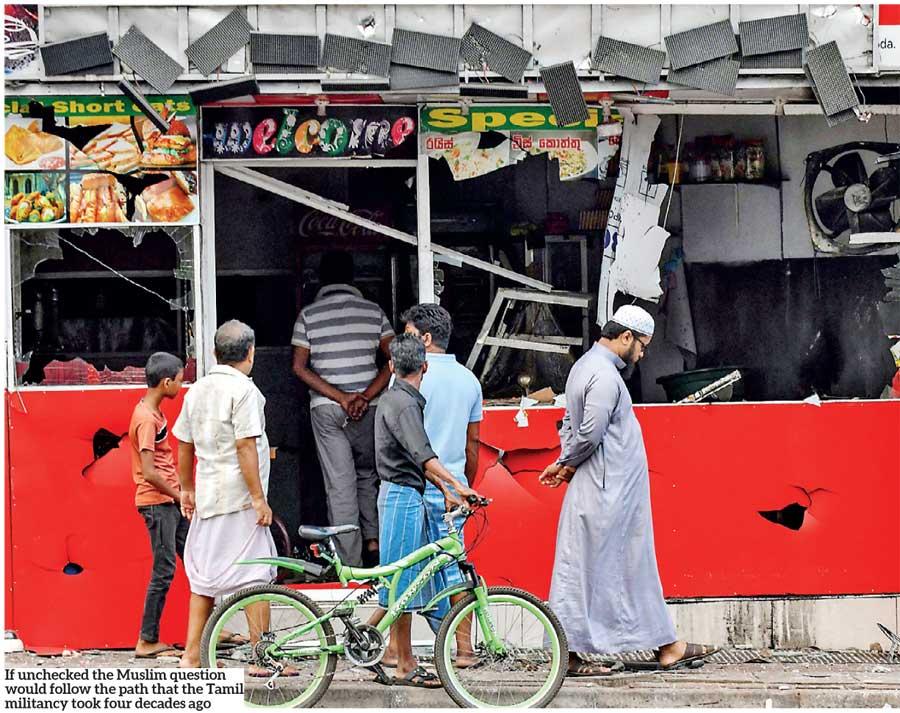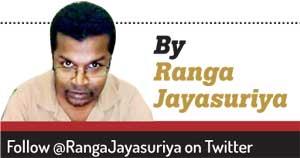Reply To:
Name - Reply Comment

- Mahinda Rajapaksa should be applauded for having political will to end the monstrosity in the North
- Easter Sunday attack is only the tip of the iceberg
- A lot of anti-Muslim hate in social media and a very public campaign for boycott of Muslim shops
- Infractions should be dealt with as a matter of national exigency
What could Sri Lanka’s independent leaders have thought as key challenges that awaited them, when the country received independence some seven decades ago?
That is a lot more intricate question than it may sound. In the first place, given the absence of strong institutions and established traditions in those nascent states, the new ruling elites had to rely on their hunch. Even where there were substantially equipped bureaucracies in places such as India, and to some extent, in Sri Lanka, those colonial inheritance had to play a second fiddle to charismatic native leaders.
Thus it is partly a matter of personal attributes of the leader that influenced the decisions of those countries. They took decisions that changed lives for generations.
Their personal characteristics, political views, risk susceptibility and world outlook etc. made the leaders interpret the similar internal or external conditions vastly different from each other. So Mao and Nehru, who were faced with a world of evolving bipolarity and similar domestic and economic conditions, responded in strategies that were polar opposite.
 Sri Lanka as a new nation did not have to confront those existential conditions of external threats at the independence- or even now.
Sri Lanka as a new nation did not have to confront those existential conditions of external threats at the independence- or even now.
Anyone who has surveyed Sri Lankan ( then Ceylon) polity, with a dose of dispassionate realism would have seen that the potentially most pernicious dangers lay within. The most obvious of all was the country’s demography. Its ethnic diversity, though many prefer to feign as a strength, has always been a challenge and at times a burden. Then leaders should have known it when Jaffna Tamil elites refused to take part in the government and launched an incremental protest campaign. What was at play was a very strong social cultural dynamic of Tamil exceptionalism that pit the Dravidian civilization against the Sinhala Buddhist majoritarianism.
If they looked beyond the Palk straits, they could also have seen the same dynamic unfolding in Tamil Nadu in anti-Hindu agitation. They could also have seen how the other countries addressed the domestic threats proactively, be it India that opted to a quasi -federalism and took a back foot on Hindu langue imposition after the language riots in 1965- or in Singapore where ethnic relations were highly choreographed.
Sri Lankan leaders did nothing, and we were burdened with twin insurgencies and subsequent terrorism both in the North and the South. Mahinda Rajapaksa should be applauded for having political will to end the monstrosity in the North, and Ranjan Wijeratne for ending the barbarism in the South. The militant manifestation of both insurgencies conclusively.
But, the encumbrance of the ethnic diversity has not changed. If anything, the policymakers should be concerned about the prospect of ‘ the minority problem’ acquiring another dimension: an Islamist militancy and Wahhabi religiosity. Easter Sunday attack is only the tip of the iceberg. As much as it uncovered the extent of radicalisation that had taken place over the decades, it also created extremely polarizing conditions that could probably drive more Muslim youth into religious terrorism.
Seven terrorists who blew up on the Easter Sunday were acting on behalf of the global Salafi Jihad and unleashed carnage on Sri Lankans and foreigners holidaying here for matters we have neither control nor association. Theirs were not local grievances. However, if the current trend of ethnic polarisation and collective demonisation of Muslims persist, the next batch of Muslim youth would be blowing up to settle domestic scores.
If unchecked the Muslim question would follow the path that the Tamil militancy took four decades ago. Tamils, cheered for nationalist rhetoric of Amirthalingam and Chelvanayakam, but, they neither had strong enough grievances nor a collective suicidal inclination to plunge the community into a war that wiped out half of them, and their place in the country for decades to come.
However, a chain of events along the line set the tone for gradual escalation from both sides, which finally ended in Vella Mullivaikkal.
At all cost, Sri Lanka should avoid the recurrence of a similar calamity. Its leaders should also be mindful that only the good intent would not suffice to do that.
They should come to terms with the cold blooded calculations of Sri Lanka’s minority problem. The root of which is both the successive governments, and minority leaders have refused to acknowledge Sri Lanka’s demographic reality. To begin with this is predominantly ( 75%) a Sinhalese Buddhist country. Minority leaders, especially those of Jaffna Tamil, and evangelical Christian origin, have a problem with acknowledging that reality. That would also mean that one in four Sri Lankan is not a Sinhalese, or Sinhalese Buddhist. That would also mean that Sri Lanka is for all of its communities with equal rights and equal protections. Sri Lanka’s vocal Sinhalese Buddhist nationalists have a problem with acknowledging that bit.
"However, if the current trend of ethnic polarisation and collective demonisation of Muslims persist, the next batch of Muslim youth would be blowing up to settle domestic scores"
The Government should not expect the enlightenment to dawn on each of its competing communities. It should regulate ethnic relations and draw the red line that ought not be crossed. It should introduce strong anti-hate laws and sedition laws. It should exhibit a political will to enforce them irrespective of the ethnic, religious or political affiliations of the perpetrator.
If it is serious, there is a lot of anti-Muslim hate in social media and a very public campaign for boycott of Muslim shops, that ought to be cracked down. In any country that takes its ethnic amity as a matter of supreme national importance, those hate mongers would be in jail by now.
Similarly, as this correspondent has repeatedly called for, a concerted campaign should be launched to reverse Arabization and restore the primacy of Sri Lankan Muslim culture and values.
Same values of national cohesion should be promoted as a national policy. Infractions should be dealt with as a matter of national exigency, meting out a good enough retributive cost.
Sri Lanka had only a ceremonial Army during the formative years of the Tamil militancy. Whereas the current Sri Lankan security forces are more than competent enough to address all forms of domestic security challenges, provided they are given the mandate. However, strong security measures can do only so much. If the political system is rotten and incompetent, and keeps turning a blind eye to growing polarisation at all fronts, it would end up creating tidal waves of instability that no army can hold off.